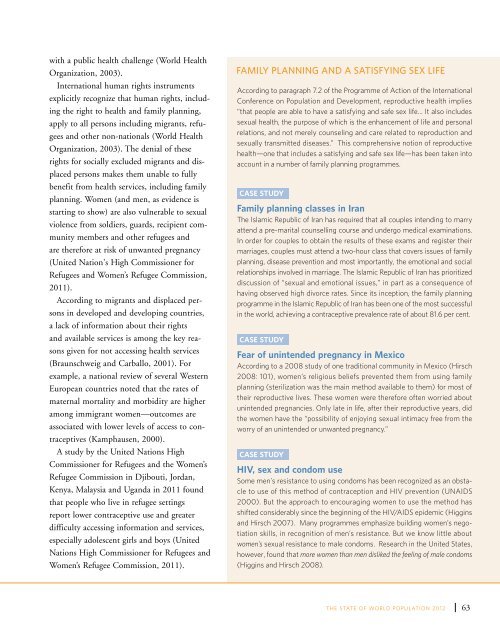State of World Population 2012 - Country Page List - UNFPA
State of World Population 2012 - Country Page List - UNFPA
State of World Population 2012 - Country Page List - UNFPA
You also want an ePaper? Increase the reach of your titles
YUMPU automatically turns print PDFs into web optimized ePapers that Google loves.
with a public health challenge (<strong>World</strong> Health<br />
Organization, 2003).<br />
International human rights instruments<br />
explicitly recognize that human rights, including<br />
the right to health and family planning,<br />
apply to all persons including migrants, refugees<br />
and other non-nationals (<strong>World</strong> Health<br />
Organization, 2003). The denial <strong>of</strong> these<br />
rights for socially excluded migrants and displaced<br />
persons makes them unable to fully<br />
benefit from health services, including family<br />
planning. Women (and men, as evidence is<br />
starting to show) are also vulnerable to sexual<br />
violence from soldiers, guards, recipient community<br />
members and other refugees and<br />
are therefore at risk <strong>of</strong> unwanted pregnancy<br />
(United Nation's High Commissioner for<br />
Refugees and Women’s Refugee Commission,<br />
2011).<br />
According to migrants and displaced persons<br />
in developed and developing countries,<br />
a lack <strong>of</strong> information about their rights<br />
and available services is among the key reasons<br />
given for not accessing health services<br />
(Braunschweig and Carballo, 2001). For<br />
example, a national review <strong>of</strong> several Western<br />
European countries noted that the rates <strong>of</strong><br />
maternal mortality and morbidity are higher<br />
among immigrant women—outcomes are<br />
associated with lower levels <strong>of</strong> access to contraceptives<br />
(Kamphausen, 2000).<br />
A study by the United Nations High<br />
Commissioner for Refugees and the Women’s<br />
Refugee Commission in Djibouti, Jordan,<br />
Kenya, Malaysia and Uganda in 2011 found<br />
that people who live in refugee settings<br />
report lower contraceptive use and greater<br />
difficulty accessing information and services,<br />
especially adolescent girls and boys (United<br />
Nations High Commissioner for Refugees and<br />
Women’s Refugee Commission, 2011).<br />
Family planning and a satisfying sex life<br />
According to paragraph 7.2 <strong>of</strong> the Programme <strong>of</strong> Action <strong>of</strong> the International<br />
Conference on <strong>Population</strong> and Development, reproductive health implies<br />
“that people are able to have a satisfying and safe sex life… It also includes<br />
sexual health, the purpose <strong>of</strong> which is the enhancement <strong>of</strong> life and personal<br />
relations, and not merely counseling and care related to reproduction and<br />
sexually transmitted diseases.” This comprehensive notion <strong>of</strong> reproductive<br />
health—one that includes a satisfying and safe sex life—has been taken into<br />
account in a number <strong>of</strong> family planning programmes.<br />
CASE STUDY<br />
Family planning classes in Iran<br />
The Islamic Republic <strong>of</strong> Iran has required that all couples intending to marry<br />
attend a pre-marital counselling course and undergo medical examinations.<br />
In order for couples to obtain the results <strong>of</strong> these exams and register their<br />
marriages, couples must attend a two-hour class that covers issues <strong>of</strong> family<br />
planning, disease prevention and most importantly, the emotional and social<br />
relationships involved in marriage. The Islamic Republic <strong>of</strong> Iran has prioritized<br />
discussion <strong>of</strong> “sexual and emotional issues,” in part as a consequence <strong>of</strong><br />
having observed high divorce rates. Since its inception, the family planning<br />
programme in the Islamic Republic <strong>of</strong> Iran has been one <strong>of</strong> the most successful<br />
in the world, achieving a contraceptive prevalence rate <strong>of</strong> about 81.6 per cent.<br />
CASE STUDY<br />
Fear <strong>of</strong> unintended pregnancy in Mexico<br />
According to a 2008 study <strong>of</strong> one traditional community in Mexico (Hirsch<br />
2008: 101), women’s religious beliefs prevented them from using family<br />
planning (sterilization was the main method available to them) for most <strong>of</strong><br />
their reproductive lives. These women were therefore <strong>of</strong>ten worried about<br />
unintended pregnancies. Only late in life, after their reproductive years, did<br />
the women have the “possibility <strong>of</strong> enjoying sexual intimacy free from the<br />
worry <strong>of</strong> an unintended or unwanted pregnancy.”<br />
CASE STUDY<br />
HIV, sex and condom use<br />
Some men's resistance to using condoms has been recognized as an obstacle<br />
to use <strong>of</strong> this method <strong>of</strong> contraception and HIV prevention (UNAIDS<br />
2000). But the approach to encouraging women to use the method has<br />
shifted considerably since the beginning <strong>of</strong> the HIV/AIDS epidemic (Higgins<br />
and Hirsch 2007). Many programmes emphasize building women’s negotiation<br />
skills, in recognition <strong>of</strong> men’s resistance. But we know little about<br />
women’s sexual resistance to male condoms. Research in the United <strong>State</strong>s,<br />
however, found that more women than men disliked the feeling <strong>of</strong> male condoms<br />
(Higgins and Hirsch 2008).<br />
THE STATE OF WORLD POPULATION <strong>2012</strong><br />
63
















